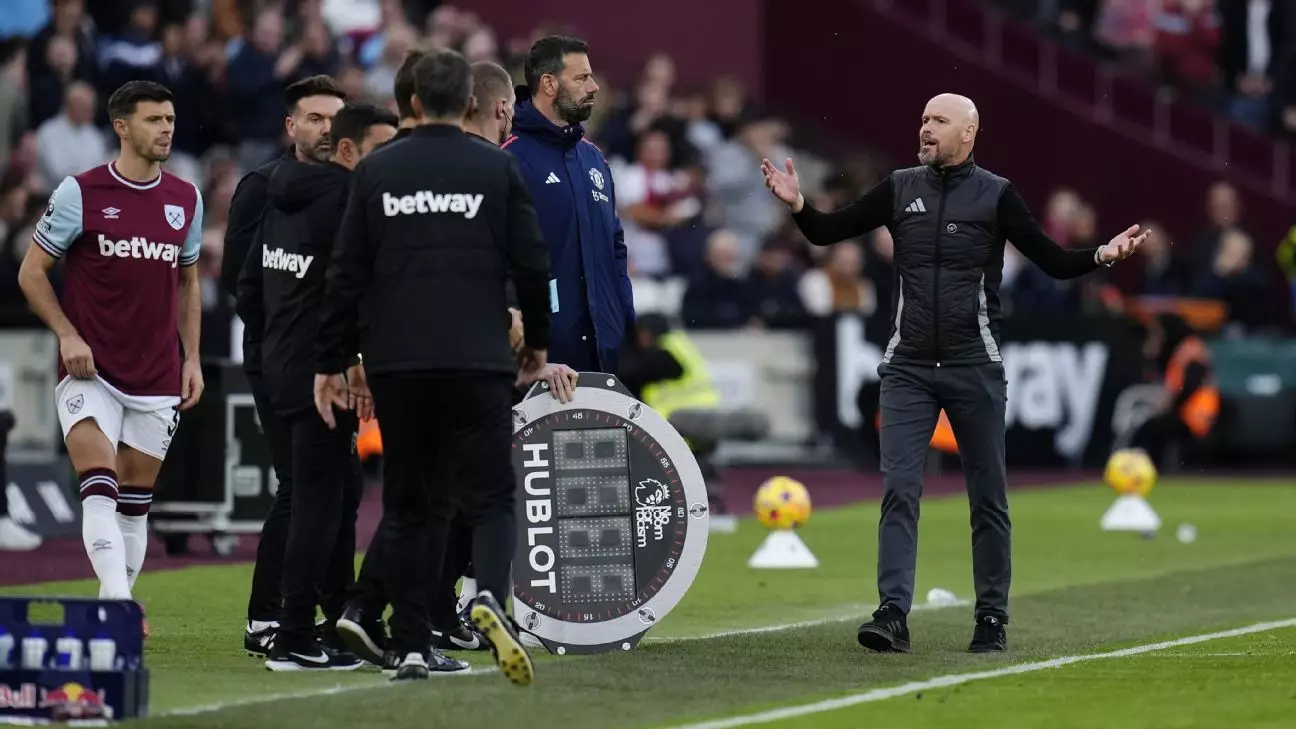The recent match between Manchester United and West Ham brought into sharp focus the contentious nature of officiating within the Premier League, as well as the increasing reliance on Video Assistant Referees (VAR). Erik ten Hag, manager of Manchester United, did not hold back in his critique of the decision-making processes that surrounded his team’s 2-1 defeat at the London Stadium. This incident invites a broader discussion on the implications of VAR, the uneven standards that sometimes appear in officiating, and the pressure these elements place on teams and their managers.
In the closing moments of the match, a hardly noticeable collision between Matthijs de Ligt and Danny Ings caused an uproar, resulting in a penalty being awarded to West Ham. The VAR intervention—the first such instance since the season’s start—has led ten Hag to question the “clear and obvious” criterion that was supposed to guide VAR’s use. Ten Hag’s assertion that a “wrong decision” was made exemplifies how VAR can sometimes exacerbate controversies rather than resolve them. If the guidelines intended to ensure fairness are not followed uniformly, then the whole concept of VAR can become questionable.
Ten Hag emphasized the inconsistency in VAR applications, contrasting this incident with an earlier occurrence involving Bruno Fernandes where he believed intervention was warranted yet nonexistent. This raises an important issue about subjective interpretations of “clear and obvious,” as well as the accountability of VAR officials. The disparity in the implementation of such standards can be damaging not only to player morale but also to the integrity of the competition itself. When coaches and players feel they cannot trust the system, it can lead to frustration and a feeling of powerlessness.
The implications of this specific incident extend far beyond this one match. Following the defeat, Manchester United found themselves in a precarious position in the league, slipping to 14th place—an unacceptable scenario for a club of their stature. Ten Hag’s comments reflect the pressing reality that luck, or lack thereof, plays a role in football, but his insistence that team performance remains paramount cannot be ignored. It underlines an essential truth: regardless of officiating issues, teams must focus on their gameplay to secure victories.
By attributing part of the team’s disappointing start to a lack of good fortune, Ten Hag illustrates the psychological strain such circumstances can impose on players. Athletes thrive on confidence, and when external factors seem to undermine their efforts, it can lead to a decline in form. Nevertheless, he remains optimistic about the potential for improvement, invoking last season’s struggles as a point of resilience.
The Ripple Effects of Controversial Calls
The psychological toll of controversial calls extends to the upcoming matches as well, where Manchester United’s resources and capabilities will be put to the test against formidable opponents. The forthcoming Carabao Cup match against Leicester City and a league clash against an in-form Chelsea team will demand not only technical skill but also mental fortitude. The players must navigate the landscape created by inconsistent officiating while ensuring they focus on their performance.
As football lovers and analysts dissect these moments, the conversation inevitably circles back to broader questions about the rules of engagement in officiating. Can the governing bodies be more transparent about the processes that guide important decisions? What steps can be taken to refine VAR protocols to minimize human error? An ongoing dialogue between clubs, players, referees, and authorities will be necessary to forge a path towards more consistent and fair officiating standards.
The Manchester United vs. West Ham match serves as a microcosm of the ongoing challenges faced in the world of football officiating. As pressure mounts on teams and managers alike, the need for clarity, reliability, and accountability in officiating has never been more paramount. Enhanced transparency, a commitment to uniform standards, and dialogue are essential steps that could ultimately lead to a more robust and fair framework for refereeing in football, benefitting teams and fans alike.

Leave a Reply